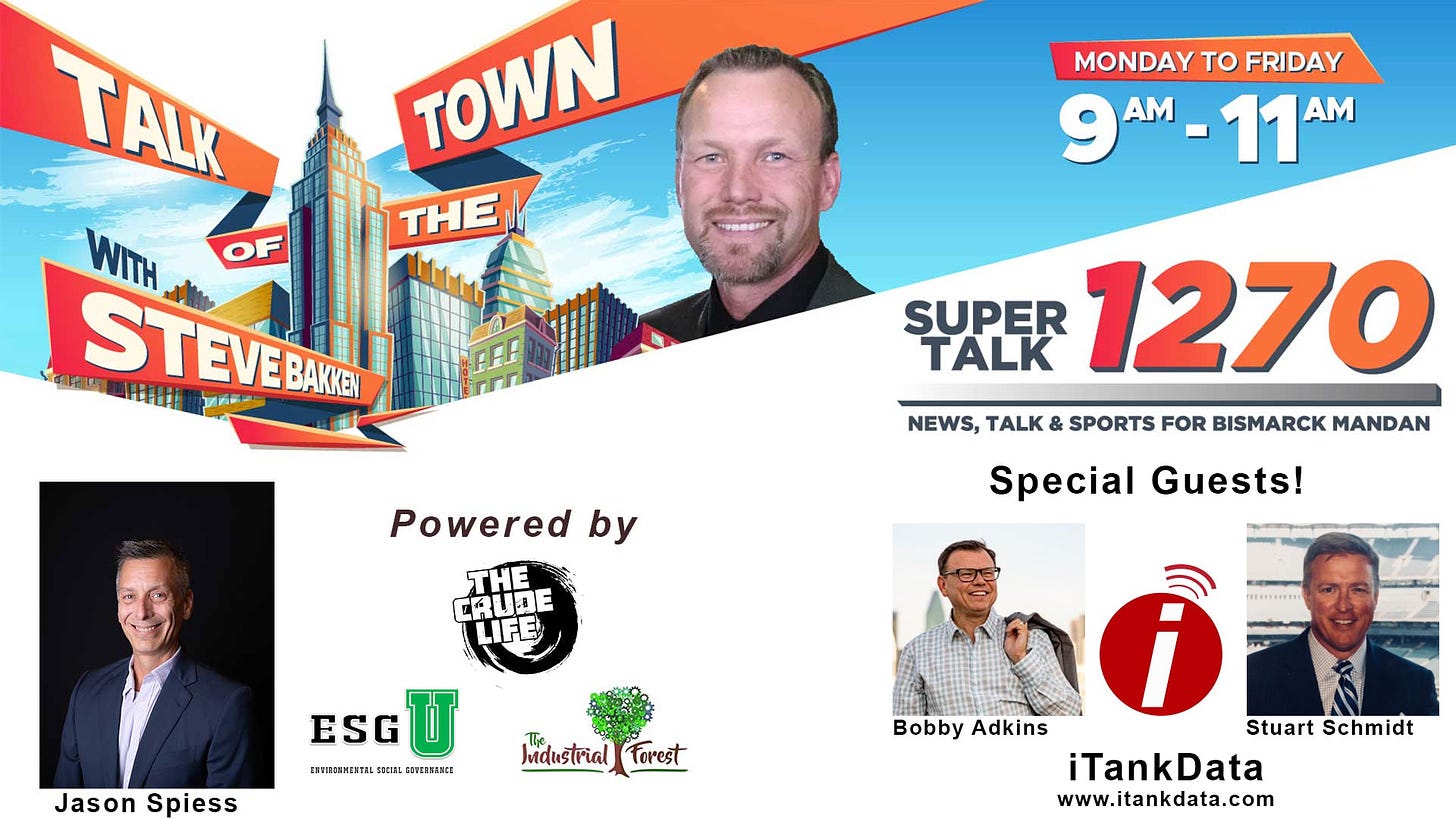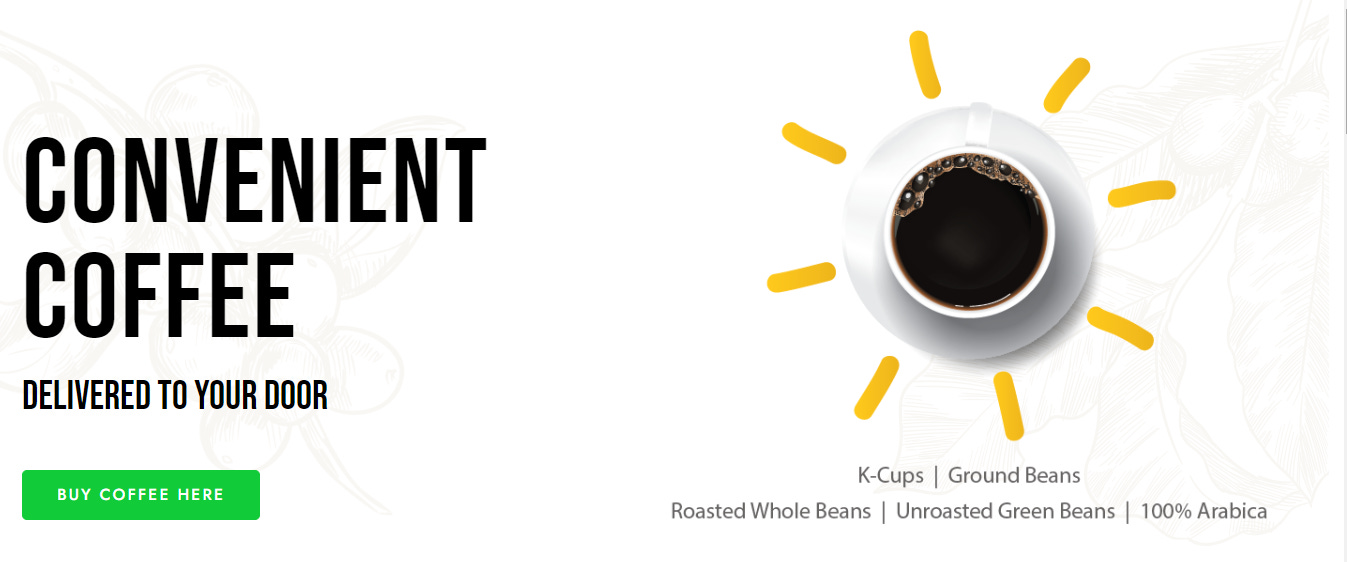It’s Wattage Wednesday on SuperTalk 1270AM Bismarck-Mandan’s Talk of the Town with Steve Bakken. Bobby Adkins and Stuart Schmidt of iTankData and joins The Crude Life’s founder Jason Spiess and Bakken during two segments of the 2-hour daily talk and news program.
The four discuss the technology of the Bakken and other oil and gas basins across the United States. The conversation specifically dove into what iTankdata does for oil and gas, which is remotely monitoring fluid levels in tanks and provides management data to mobile devices.
Adkins says the cost is $625 plus $20 a month for the data plan. Spiess compares it to a past article and interview with Kerry Frank and Comply365, which revolutionized the aviation industry with the use of iPads to save gas money.
Adkins explains that their technology is more cost-effective and accurate than competitors like SKAA systems. Stuart recently spoke with operators from Murphy Oil and OXY about bringing in additional chemical and oil field technology.
For example, in this case the technology can remotely monitor tanks and identify leaks and slow-downs, improving efficiency and catching negative events sooner. It can be used by anyone with a tank, including farmers and fuel storage facilities.
To contact Adkins or Schmidt of iTankData, click on their names or here.
Try Sunrise Coffee today! Click here for the link… and don’t forget to use the promo code OTIS!
Voice Artists Intro
Welcome back to talk of the town on Super Talk 12 70. Talk of the town brought to you by Big Boy. Just get in line. It moves fast. Dakota Pharmacy and Dakota Natural Health Center. We're here to help you stay well, trademark, realty and Silver Ranch.
Steve Bakken
You're tuned to talk of the town on Super Doc 12 70. I'm your host, Steve Bach along with Jason Spes from the Crude Life Sunday mornings. 10 AM. You can catch the Crude Life right here on Super Doc 12 70. Also follow the latest in E S G environmental social governance at E S G U dot org with Jason. He has a lot of insightful information that you need to know to navigate through what's going on in the E S G world.
You can follow him with E S G U dot org. I'm Steve Bach and this is talk of the town on a wattage Wednesday and we've got a couple of guests joining us. Uh Jason actually, you know, these guys pretty well. So I'll let you uh do the invites.
Jason Spiess
Well, I take that I have some people I I met through the conferences and through the different interviews and things like that. And they had a uh uh one of those pieces of automated uh products that caught my interest because, you know, Steve, we've been talking about the automation for years in the oil and gas. And yeah, and so the, their technology kind of caught my eye through the crude life cause, you know, we do a lot of uh industrial innovation.
And so uh uh Stewart is, uh, was speaking last week down in Houston and because of the snow, we got stuck up here, but we were gonna go down there and actually do the show from Houston so that we could talk to these guys. And, uh, uh Bobby, are you still on the line? Do we have you on there? Absolutely.
Bobby Adkins
Bobby,
Jason Spiess
Bobby Atkins. All right. I don't just, uh, Stewart joined us as well, ... but we're still waiting on him. Ok.
Bobby Adkins
OK. Yes. Not on yet.
Jason Spiess
That's OK. He'll be joining us any second. So, uh, Bobby, why don't you go ahead and talk us through for, uh, first of all, some of the business that you're doing currently in the box and, and what that business is because you actually go into other areas outside of oil and
Bobby Adkins
gas too. So, uh Yes. Yes. And uh, thank you for asking, uh, uh, what we, what we've done from years gone by, we've been in the oilfield supply business up in the bak throughout the Williston Basin. And uh, the sweet water pumping supply. And, um, so we, we will go way back. We're not there. Now, that company was sold and we've rebuilt another. But in the technology space, we spent a lot of time in oil and gas, specifically trying to help operators be more efficient. Chemical companies
be more efficient. So we've been able to work a lot with credence chemicals up there in the, of course, you're headquartered there and they're doing a lot of great things and we're able to tell you the fluid and the amount of fluid that's in your tank on a 24 7 basis, that'll go straight to your cell phone. So we just kind of have a tagline of uh hey, why don't you just talk to your tanks and it comes through alerts and just jumping on and knowing your fluid levels at all times.
Jason Spiess
So, one of the things that caught my interest was one of the first stories that we did actually in uh the was that this is not an oil play, it's a technology play. And so we started kind of covering a lot of the different technologies. And one of the interviews early on was this uh female, her name was Carrie Frank. And uh she basically brought the aviation industry on the ipads. And what we found was that, you know, the big data and some of the automation things really showed where
savings occurred all the way down to the gas because these, uh, these airplanes used to have to bring on a £50 black box. Well, eventually they found out over the time of the year that the bringing of the ipad on there actually saved gas money. Those nickels make dollars. And that was the part of your technology that I loved was this is something where now that you've seen it play in real time. Oh, you guys are really saving money for these companies. Uh
Bobby Adkins
Absolutely. And uh if you just start to bring in the efficiency from someone driving to every tank to literally have to eyeball it and write it down or text it in when you got it instantly sent to your phone every day. And the amazing thing is the cost and the price point. We're using cell based technology with our transducers and our connection points on a hydrostatic weight measurement.
So it's very accurate. It's the most accurate in the industry of anybody trying to measure tax. But we can set this up for half the price of a cell phone, which is around $625 plus tax and $20 a month on a data plan. Much like we use a cell phone data plan today which includes alerts of highs and lows and empty tanks or even measurements uh that you can set. So for $20 a month, we've created management tools to go along with saving drive time, gasoline vehicle tires, oil changes,
insurance, health care plans and the human beings that are working. We can have those focused in other areas on other activities at a higher level, higher and more valuable means of daily time is spent. So these companies advance more, make more money and certainly leapfrog those that aren't using a technology like this.
Steve Bakken
We're talking with Bobby Adkins and uh Stuart I believe has joined us as well with the I tak data. Um uh Jason Spes, of course, with the crude life, I'm Steve Bach and uh this is a wattage Wednesday on Super Talk 12 70 Bobby, I wanna go back a little bit further because uh you know, Jason brought up a great point, not an oil play, a technology play. And I look at where we used to be in North Dakota with the Bakken and we were about 9, 10, 11 years ahead of everybody else. We've let everybody
else catch up. So go back and talk about the technology from where we were 10 years ago and then the little decrease in the oil prices and a little slack that took place. And then the resurgence of the oil boom, technology has been there the whole time. But when you're looking at a permian versus a Bakken, what's changed? W w where, where has the permian caught up there? Or the Bakken slowed down? What have you seen from a technology perspective?
Bobby Adkins
Well, from a technology perspective? I think you had some of the most innovative guys in the country out of credence being a chemical provider. And their leadership was able to see that this could save money but make more money and be more profitable and advance the overall communication by technology with, with daily needs and daily workloads.
So a lot of times it takes an innovative mind and a willingness to try it, which they did and they are growing uh like you wouldn't believe because the other competition that's not using tools like this, they're being left behind and it makes the bakke more efficient with really three key areas that we work with with these tools. Number one is your chemical delivery and making sure it's a proper dosage so your wells can be maintained and not have problems.
Secondarily is the, it is the oil fill and also with your water fill. So if they're in tanks, you know, when to pick up or deliver down pipelines using, using this technology, and the, the price point is the key because you've got Ska systems, that's probably our biggest component we have to compete against is because SKA systems are very, very expensive. And the past Ska systems could easily run into seven figures on larger fields, certainly into six figures.
And the way we've got this set up now from a cost and price point, it uh it makes the industry much more efficient and that of course, helps if you're having to ship oil from the Bakken to the refineries or wherever it may be, every penny matters. And this is certainly a gainer for the industry
Jason Spiess
wanna bring in Stewart from I Tank dad. At, at this point before we take a break here in just a couple of minutes. Uh, the crude life, we were gonna head down to Houston. We got sucked in with a little bit of snow. But, uh, I tell you folks, it was for a global chemical conference and I tank data was one of the, one of the featured speakers on there.
Uh First of all, Stuart, welcome to the program. And, uh, what was it? You were, what was it you were speaking on? And who are you speaking with? I saw it was a couple of heavyweights in the industry.
Stuart Schmidt
There were some heavy weights, uh for sure. There was a gentleman from Murphy Oil and a gentleman from, uh, it was OXY if I remember correctly. And, uh, yeah, they, the topic of the panel was to, you know, bring an update and perspective to, um, analyzing the opportunity to use additional technology, uh from a chemical standpoint in the oil field, how to analyze it, how to review it, how to, you know, process, uh the information from the companies and what to look for.
And so what we were able to talk about in the group was, you know, just boots on the ground. What does this mean to your people, you know, that are doing this job. Uh What does it mean to the operators? What kind of data can they now expect to, to bring in that? They haven't been able to bring in before? And, you know, we just talked about the fact that, you know, in today's world people are busy.
They've got a lot going on. They, they've got a lot of stresses a, a lot of these oil people are, are, you know, in their trucks at five AM heading out to the field to do work and, and to sit there and go. Ok, how am I going to find time to, to insult technology and to use it? You know, we had to give them and we're giving them, you know, ways to look at it and say, ok, this is not gonna be that hard.
We can get it going and then once we get it, get it out and deployed very easily, my life is gonna be substantially better. I mean, I, we talked about it and we said, you know, imagine, you know, rolling onto the field at six AM and you've got all your tank levels on your computer or on your phone, you could see all your tank levels first thing in the morning.
So you're, you don't even have to drive and look at all of them. You can figure out from, from the data who we need to go check on who we need to look at. And then from the operator side, you know, bottom line is you're trying to get longer runtime and your biggest expenditure supporting that is your chemical uh production chemicals. And so, you know, if you're spending all that money on it and, you know, you're trying to optimize that and make sure it's definitely working having tank
level uh usage of data. Um So, you know, what did we get, what we set the rates to, to deploy? Do we get that optimum benefit out of it? Do we get the longest run times that we get? Can we improve it? You know, what, what impacts do we have? And so, you know, operators
Jason Spiess
sorry about that. I, I, sorry, I didn't mean to jump in. I was taking a look at the clock there for a second but I thought I uh I was just thinking in my head, boy, you guy and I'm not your marketing director by any means. But you get what, what you're describing is a Fitbit for the field. I mean, it's a Fitbit for the facility.
That's really what you're talking about. You get up in the morning, you check out your Fitbit and you know exactly how your field and your facility is. That's a fantastic thing. I didn't mean to cut you off, but I saw that we got, we got hit a commercial break, Steve. So uh you owe me one
Steve Bakken
definitely. But, but I want to come back and talk a little bit about the official and the logistics side of things and what that means for workforce because that's something we're up against here in North Dakota. In fact, the news coming out yesterday, our former lieutenant governor now in charge of trying to find more workforce for the oil patch in western North Dakota. This is talk of the town on Super Do 1270. I'm Steve Bach along with Jason Sp from the crude life.
Sunday morning's 10 AM on Super Talk 12 70. We talk with Bobby Adkins and Stewart from I tank data. They do work with credence, do work in North Dakota and uh you know, I'm a big fan of the kiss principle and that seems what they have stumbled on to because sometimes for people like me keeping it simple, stupid is a good thing to do. This is talk of the town on Super Talk 12 70. Talk
Voice Artists
of the town Super Talk
Steve Bakken
12 70.
Voice Artists
Welcome back to talk of the town on Super Talk 12 70. You're tuned to talk
Steve Bakken
of the town on Super Talk 12 70. I'm Steve Bach along with Jason Sp from the crude life Sunday morning's 10 AM. You can catch the crude life right here on Super Talk 12 70. We're talking with it. Tank data. Bobby Adkins and Stuart Schmidt from I tank data and going into the break, we're talking a little bit about workforce. Of course, I mentioned the lieutenant governor has been tasked former Lieutenant Governor Brent Sanford, tasked with Petroleum Council finding workforce.
And, and when you take a look at what you guys have come up with, with I tank data and working closely with credence out in the oil patch in North Dakota, uh with the ability to cut down on some of the labor force needs. Logistics. Of course, cost is always always tied with logistics, but it's also man hours and getting from one site to another site in a rural setting takes time.
Uh So we're cutting down on some of the labor costs, some of the labor logistics uh that frees up a lot of workforce to do other things. And that's one of the things that you guys have uh really come across with I tank data.
Stuart Schmidt
Yeah, you know, consistently. Go ahead.
Bobby Adkins
No, no, go ahead, consistently. Go ahead.
Stuart Schmidt
Yeah, consistently across our uh petro chemical chemical vendors. Um The one thing that's, that's uh you know, we've seen in each case is, is an improved efficiency of 20 to 25% pickup in time of the week. And that time has normally been being spent uh driving and checking tank levels and checking for, you know, pump activity and things like that.
And now the ability to see all the tanks and do inventories from an office remotely within literally minutes across as many as 500 to 1000 tanks. Um, that, that's now, you know, fewer driving miles, fewer people driving around, checking on those things. They can tell that that the pumps are working properly. They can, you know, identify the tank levels and that, you know, the, the, what the rates that are going down are in line with what they should be versus literally driving
from tank to tank to tank to tank and having people doing it for hours and, and days at a time each week. And so that, that's been one of the, one of the things that the, the clients, you know, they all operate a little bit differently, but they've consistently told us that's one of the biggest savings.
Jason Spiess
How about when it comes to some of the other areas as well? I mean, um, safety or whether it's, uh, response time. Um, I would imagine that that stuff is completely more priceless really. If you talk about some spills and
Stuart Schmidt
response time. Yeah, 100% right on that because, you know, we report, uh, usage on a daily basis. You know, they can tell if a pump is slowed down. Most times they've slowed down, sometimes they've sped up or there's a leak or some type of drain by being able to identify that, you know, they can catch it within 24 to 36 hours, uh, versus, you know, maybe it might be a week later when they drive up the tank and they see, it's been dripping the whole entire time and, and that's not uncommon.
It's, it's not anyone's fault, it's the nature of, you know, the oil and gas space. Uh, and that's why they have containment there as well. But, um, that, that's one of the things they can tell and, yeah, they absolutely can get to that quicker again if, if you're, if you're trying to optimize the run time of your, well, between having to
repair the well from usage. Um knowing that the the amount of tech of uh chemicals that are need to be and targeted to be applied are being applied, makes a huge difference.
Jason Spiess
What uh what are some of your uh customers outside of oil and gas? Is it mu municipalities? Is it industrial, you know, size buildings, you know, hospitals, I guess who would be your uh I I like to ask people, you know, who is your
Stuart Schmidt
customer? Right? So our customers, anyone with a tank um and that needs to be modified. Um Literally, I mean, fuel, fuel distributors definitely uh diesel, unloaded gasoline. Uh ...
Jason Spiess
but we need,
Stuart Schmidt
yeah, any liquid fertilizer they have, we can monitor all of that. I mean, we, we look, we are, as I mentioned at the top of this. Um we are definitely one of the, if not the only tank monitoring company in the United States. I can say we can monitor any type of fluid in any type of tank anywhere in the United States.
Um So yes, any, anybody that has a challenge with needing to have monitoring of a tank done, even if they don't need to have a remote monitoring, but they need a display at the tank that's too tall to get up and check, they wanna walk up and hit a button and see what's in the tank. All of those capabilities we have
Bobby Adkins
just include acid. Uh That's a difficult one. Yeah, that's another good one. Um, you know, so when people go to our website, I tak data dot com, they're able to see an array of things, but there's also click buttons there that they, they can add their information and we can call them back or they can dial in. And so it makes it really easy to be in contact with one another with some of the difficult questions that seem difficult to them, but they're actually pretty simple for us.
Steve Bakken
You know, now I'm starting to think about the agriculture side a little bit more as well and, you know, we're getting into spring time finally showing up and, uh, you know, how many farmers or ranchers like to be able to take a, uh, a few minutes off and maybe go fishing or, or maybe in the fall, do a little hunting and, and we, we, we gotta monitor the tank and I can keep an eye on what's going on because we talk about all the, the technology involved with being able to monitor things and
what that does is it frees up time. Uh, and for whether it's the oil patch or if it's somebody in the farming or ranching industries, time is, is, is very valuable. That's the one thing you don't get back, the ability to not have to put so much time in the logistics side of stuff. There's a lot of cost savings there but there's also that time whether it's the ability to, um, if you're a dairy farmer to, to monitor those milk tanks and, and, oh, ok.
Now I gotta go back to doing what I do, but I freed up some time to go to my kids' hocker game. Uh, you know, whatever it is, uh, there's an opportunity to use technology very simply at your fingertips in a fashion that we've all become accustomed to right on your phone that is going to save time and money.
Stuart Schmidt
You know, one of the things that we, one of the things that we can run across the scene with clients across the board is almost anything that has or hasn't happened with a tank is time consuming, especially if you have an event. That's, that's a negative event. So, on a crude oil tanker or produced water tank, you have a spill, it's very expensive.
It's, it costs a lot of time and a lot of effort, it pulls away from other projects. At least the faster you can catch those things or prevent together it's a significant savings. And I think that's a lot of things, a lot of types of things that people tend to just, yeah, I'm just gonna block that out of my mind that we had that happen and all the time drain that had occurred. But, you know, seeing what's going, like we used to say, from time to time, um, seeing what's, what's the level is in
your tanks is better than not seeing what the level is in your tanks because seeing it, you, you, you're gonna catch things significantly quicker and save a lot of money on, on reclamation projects, but also just, just overall human resource time from deal with problems because you can catch it quicker.
Bobby Adkins
Hey, I'm, I'm might throw in a funny story. We like to speak of this in terms of a hired better use of your time. And so you really hit the nail on the head with some guys and one in particular. He said, yep, I figured out my higher and better use. I can get away and hunt a lot more than I could.
Steve Bakken
Something near and dear to our hearts here in North Dakota. So, but, but that does get that opportunity and you know, now we're getting into the springtime Missouri River, hey, opportunity to catch a new state record wall. I right here in Bismarck, loving that opportunity as well.
So, uh gentlemen, uh as, as far as the website I tak data dot com, a great place to look for information there. Um If you're in North Dakota, it reach out to a credence. What, what's the best route to take a look? Better? Look at your product.
Stuart Schmidt
Definitely reach out to us on our website. Um, or our phone number is 817 855 4992. Give us a call, we can send uh product information over to you fairly quickly. We respond to all calls within a few hours, usually if not a few minutes. Um And so, you know, you know, we can do a quick portal demo in just a matter of minutes um via Webex just uh it's not hard to pick up and learn most of our, you know, client training is 30 minutes tops and they're ready to go and, and they can use a portal, they
can install the tank monitors and they're off and running. So, yeah, everything somebody would be interested in looking at, they can see the information on it data dot com or give us a call at 8178554992. And we're happy to take a few minutes
Steve Bakken
to talk to them. And the best part is you don't have to pass your phone off to your six year old to figure out the technology. Right.
Bobby Adkins
Exactly. It's all there.
Steve Bakken
Uh Bobby at,
Jason Spiess
go ahead. I think it's great. Uh Guys, thanks for coming on. And as far as I, I know the, uh, news couldn't have been any better because you guys are ready, willing and able and ready to work in the, uh,
Stuart Schmidt
we already have, we already have probably close to 1000 monsters in the market now. Yes.
Jason Spiess
Oh, fantastic. And they, they, they, they want to put some more in there. Get some growth going. All right, we went out, we, we found somebody right away and uh good deal guys. So we look forward to it. Steve, go ahead. I know we got the news coming up. So,
Steve Bakken
uh guys, thank you very much, Bobby Adkins Stewart Schmidt with I TAK data. Uh You can check them out at I tak data dot com. Gentlemen, thanks for coming on. We'll have to talk again. Thank you. Thank you. This is talk of the town on Super Talk 12 70. I'm your host, Steve Bach along with Jason Spes from the crude life.
You can catch the crude life Sunday morning, 10 AM right here on Super Talk 12 70. And when we come back, uh Jason and I are gonna get into a little bit of the uh new EPA proposed stricter vehicle emission standards and well, we might go in another direction or two as well. This is talk of the town on Super Talk 12 70.
Please consider supporting those who are Living The Crude Life! The oil and gas worker is experiencing the same public relations issues the farmer’s faced decades ago when the grocery story replaced them. Only it’s the light switch that has replaced those Living The Crude Life.
Your company and/or personal support will allow positive, informational and educational stories, interviews and podcasts to continue. Real talk. No scripts. Just energy experts and real crude talk.
Paid Subscriptions are only $5 and keep the articles, podcasts, news, essays and insights coming.
Network online, in social media groups and in podcast land! Support the industry’s voice for only $5!
Did you know supporting The Crude Life is more sustainable for the planet than a $5 Starbucks Coffee? You have the power to make a difference! Support The Crude Life today!
For guest, band or show topic requests, email studio@thecrudelife.com
About The Crude Life
Award winning interviewer and broadcast journalist Jason Spiess and Content Correspondents engage with the industry’s best thinkers, writers, politicians, business leaders, scientists, entertainers, community leaders, cafe owners and other newsmakers in one-on-one interviews and round table discussions.
The Crude Life has been broadcasting on radio stations since 2012 and posts all updates and interviews on The Crude Life Social Media Network.
Everyday your story is being told by someone. Who is telling your story? Who are you telling your story to?
#thecrudelife promotes a culture of inclusion and respect through interviews, content creation, live events and partnerships that educate, enrich, and empower people to create a positive social environment for all, regardless of age, race, religion, sexual orientation, or physical or intellectual ability.
Spread the word. Support the industry. Share the energy.
Click on picture for BIG SAVINGS! Check out these Amazing American Environmental Entrepreneurs! Don’t forget that the promo code OTIS unlocks big big savings!
if link is broken, use promo code OTIS at www.mystore.com and www.mypillow.com



















The Crude Life Podcast: iTankData takes over Talk to the Town